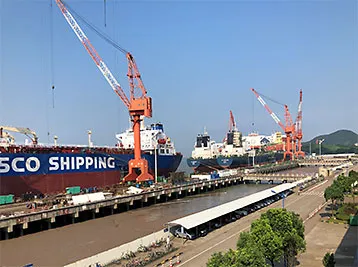The COVID-19 outbreak has resulted in delays to retrofit installations of exhaust gas cleaning systems (EGCS) – or scrubbers. This news gives guidance to owners/operators who due to a delay in the installation of an EGCS, now have non-compliant fuel on board.
Relevant for ship owners and managers, yards, suppliers, design offices as well as flag states.
From 1 March 2020, high-sulphur fuel oil (HSFO) cannot be carried in the fuel oil tanks unless the vessel is fitted with an ECGS or other approved equivalent arrangement. However due to the COVID19 crisis, there are some vessels where the installation of the EGCS was not completed before the March deadline as planned, and still have HSFO in their bunker tanks.
There is no general procedure in place how to deal with ships, which are currently in dry dock for installation of EGCS, having non-compliant fuel oil on board. The IMO does not consider COVID-19 to fall under force majeure. In addition, the “unforeseen delay” clause in MARPOL only applies to new buildings and not alterations/conversions, see also Circular Letter No.4204/Add.7.
This means that vessels without an approved EGCS which are carrying non-compliant fuel exceeding 0.50% Sulphur are in breach of MARPOL Annex VI. Vessels which are not able to de-bunker will need to find a solution acceptable to PSC and the flag. In such cases, MEPC.1/Circ.881 GUIDANCE FOR PORT STATE CONTROL ON CONTINGENCY MEASURES FOR ADDRESSING NON-COMPLIANT FUEL OIL applies.
If your ship is in this situation, DNV GL recommends that you are proactive, transparent and cooperative with authorities. Enforcement falls to the port state, with the guidance stating that “the port State, the flag state and the ship should work together to agree on the most appropriate solution to address the non-compliant fuel.” This may imply de-bunkering or retaining the fuel on board.
In dealing with the bunker, PSC must evaluate and decide on “managing the non-compliant fuel oil in accordance with a method acceptable to the port state”. DNV GL’s advice is, in order to ensure no emissions to air beyond what is acceptable by MARPOL, to seal off the inlet and outlet valves of the tank containing the non-compliant fuel, noting the seal numbers and tank sounding in the oil record book (ORB) under “Additional operational procedures and general remarks”, all witnessed and endorsed by a DNV GL surveyor.
Prior to the de-bunkering or after completing the scrubber installation the same would apply, breaking of the seal should be witnessed and the ORB endorsed accordingly and any receipt for delivered fuel should be filed on board in the ORB. This should be followed up with a Condition of Authority, or a short term IAPP, depending on flag instructions.
Recommendations
If your vessel has HSFO on board due to a delay in EGCS installation, it is vitally important to proactively contact PSC and inform them of the situation. Be transparent and cooperative to implement any required contingency measures with the acceptance of PSC and the flag.
References
Contact
- For customer: DATE – Direct Access to Technical Experts via My Services on Veracity
- Otherwise: Use our office locator to find the nearest DNV GL office.
